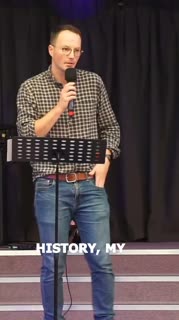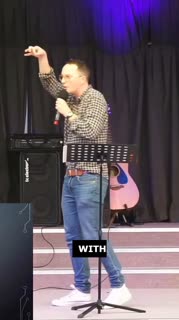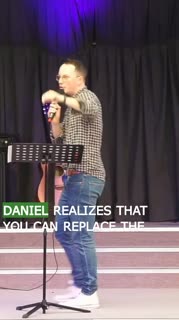Visions of Hope: The Kingdom Beyond Empires
Devotional
Sermon Summary
Bible Study Guide
Sermon Clips
1) "History, my friends, is normally written by winners. If you study history, you're taught to have a little check of the bias. Because when we read the story of history, the people who manage to write down the history are normally the ones flourishing, they're normally the ones on top. Our Bible is not written by the winners. Our Bible is collected and first written down by those exiles, the people on the bottom rung of society. Those who have suffered, those who have lost, those who have got much to lose as they live under power structures that are not theirs." [46:12] (39 seconds)
2) "And let's remind ourselves that our Bible was written by the losers. That whereas King Nebuchadnezzar, King of Babylon, sees them as statues, well of course he does, he's the king, that Daniel, our prophet, sees them as a beast. And I need to be careful, and if I'm going to be honoring to Scripture and honor to our Scriptures and honoring to our Bible, then I need to ensure I am amplifying the voices of the victims. If we are Christians taking this seriously, we need to make sure we are hearing the voice of those on the bottom rungs of society." [52:32] (36 seconds)
3) "Many of us, even today, we have the voice in the back of our head saying, you can sing your songs. You can pray your prayers. You can come and sit here on a Sunday and lift up your hand. But when you get home, remember who's in charge. My friends, we don't use terms like Assyrians or Medo-Persians nowadays. We have different names for power structures. Terms like debt that really runs your life, yeah? And that voice in the back of your head says, oh, it's all well, you can sing your songs, but when we get home, just remember who calls the shots in your life." [55:07] (30 seconds)
4) "And they do it with imagination. And they write poetry. And they do art. And they write songs. And they write stories. And for some of us who are living under that pressure, we need to engage in that art. We need to write some songs and draw some pictures and hear that prophetic artistic voice that says, there is hope even in this shadow of the present scenario. Daniel looks and he has a dream. He has a dream that one day things will change." [56:56] (30 seconds)
5) "Daniel realizes that you can replace the Babylonians with the Greeks. You can replace the Greeks with the Romans, but you are just changing one empire for another one. You are changing the name on the door. But Daniel, as we see in this second one, he doesn't just want his present empire to fall. He wants empires planted. He wants the world to fall. Because Daniel realizes that it is not so much the energy out there that is causing him the issues. It's not the empires out there. It's not the mindset out there. It is the heart in here." [01:01:13] (31 seconds)
6) "I need a kingdom that moves with me. I need a love and a kingdom that isn't just for me on a Sunday but is just as powerful when I go home to my family. When it's more difficult. Trying to get the kids out the door. Get your shoes on. I need a kingdom that follows me there. I need a kingdom that is just as powerful on a Tuesday morning in work as it is on a Sunday morning when we're singing our songs. I need a kingdom that is going to move with me." [01:07:27] (31 seconds)
7) "I need someone who's going to look me in the eye and walk with me as I shuffle through this mortal life. But one who also points me to a better future. I need a son of man who is also clothed with authority and power and might. That's the kind of son of man I need. That's the kind of son of man I want to follow. That's the kind of son of man who I believe can make a difference. And that is the rumor going around in Daniel's day." [01:08:58] (22 seconds)
8) "Because we don't just need another empire to replace the last empire. We need a kingdom that does not slumber and does not sleep and does not rest. We need a Son of Man who does not falter in his pursuit of you. We need a Son of Man who, whilst everyone else has their time and their beginning and end, will say, I am always going to chase. The power of love will always prevail. I am the king of mercy and the king of love and my kingdom is not like those empires." [01:14:45] (26 seconds)
Ask a question about this sermon
2) "And let's remind ourselves that our Bible was written by the losers. That whereas King Nebuchadnezzar, King of Babylon, sees them as statues, well of course he does, he's the king, that Daniel, our prophet, sees them as a beast. And I need to be careful, and if I'm going to be honoring to Scripture and honor to our Scriptures and honoring to our Bible, then I need to ensure I am amplifying the voices of the victims. If we are Christians taking this seriously, we need to make sure we are hearing the voice of those on the bottom rungs of society." [52:32] (36 seconds)
3) "Many of us, even today, we have the voice in the back of our head saying, you can sing your songs. You can pray your prayers. You can come and sit here on a Sunday and lift up your hand. But when you get home, remember who's in charge. My friends, we don't use terms like Assyrians or Medo-Persians nowadays. We have different names for power structures. Terms like debt that really runs your life, yeah? And that voice in the back of your head says, oh, it's all well, you can sing your songs, but when we get home, just remember who calls the shots in your life." [55:07] (30 seconds)
4) "And they do it with imagination. And they write poetry. And they do art. And they write songs. And they write stories. And for some of us who are living under that pressure, we need to engage in that art. We need to write some songs and draw some pictures and hear that prophetic artistic voice that says, there is hope even in this shadow of the present scenario. Daniel looks and he has a dream. He has a dream that one day things will change." [56:56] (30 seconds)
5) "Daniel realizes that you can replace the Babylonians with the Greeks. You can replace the Greeks with the Romans, but you are just changing one empire for another one. You are changing the name on the door. But Daniel, as we see in this second one, he doesn't just want his present empire to fall. He wants empires planted. He wants the world to fall. Because Daniel realizes that it is not so much the energy out there that is causing him the issues. It's not the empires out there. It's not the mindset out there. It is the heart in here." [01:01:13] (31 seconds)
6) "I need a kingdom that moves with me. I need a love and a kingdom that isn't just for me on a Sunday but is just as powerful when I go home to my family. When it's more difficult. Trying to get the kids out the door. Get your shoes on. I need a kingdom that follows me there. I need a kingdom that is just as powerful on a Tuesday morning in work as it is on a Sunday morning when we're singing our songs. I need a kingdom that is going to move with me." [01:07:27] (31 seconds)
7) "I need someone who's going to look me in the eye and walk with me as I shuffle through this mortal life. But one who also points me to a better future. I need a son of man who is also clothed with authority and power and might. That's the kind of son of man I need. That's the kind of son of man I want to follow. That's the kind of son of man who I believe can make a difference. And that is the rumor going around in Daniel's day." [01:08:58] (22 seconds)
8) "Because we don't just need another empire to replace the last empire. We need a kingdom that does not slumber and does not sleep and does not rest. We need a Son of Man who does not falter in his pursuit of you. We need a Son of Man who, whilst everyone else has their time and their beginning and end, will say, I am always going to chase. The power of love will always prevail. I am the king of mercy and the king of love and my kingdom is not like those empires." [01:14:45] (26 seconds)








